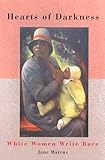Hearts of Darkness : White Women Write Race / Jane Marcus.
Material type: TextPublisher: New Brunswick, NJ : Rutgers University Press, [2004]Copyright date: ©2004Description: 1 online resource (240 p.)Content type:
TextPublisher: New Brunswick, NJ : Rutgers University Press, [2004]Copyright date: ©2004Description: 1 online resource (240 p.)Content type: - 9780813529622
- 9780813542515
- 823/.91209355 21
- PR888.R34 M37 2004
- online - DeGruyter
- Issued also in print.
| Item type | Current library | Call number | URL | Status | Notes | Barcode | |
|---|---|---|---|---|---|---|---|
 eBook
eBook
|
Biblioteca "Angelicum" Pont. Univ. S.Tommaso d'Aquino Nuvola online | online - DeGruyter (Browse shelf(Opens below)) | Online access | Not for loan (Accesso limitato) | Accesso per gli utenti autorizzati / Access for authorized users | (dgr)9780813542515 |
Browsing Biblioteca "Angelicum" Pont. Univ. S.Tommaso d'Aquino shelves, Shelving location: Nuvola online Close shelf browser (Hides shelf browser)

|

|

|

|

|

|

|
||
| online - DeGruyter American Reform Judaism : An Introduction / | online - DeGruyter Global Currents : Media and Technology Now / | online - DeGruyter Happy Days and Wonder Years : The Fifties and the Sixties in Contemporary Cultural Politics / | online - DeGruyter Hearts of Darkness : White Women Write Race / | online - DeGruyter Ladies' Pages : African American Women's Magazines and the Culture That Made Them / | online - DeGruyter New Perspectives on Environmental Justice : Gender, Sexuality, and Activism / | online - DeGruyter Sweated Work, Weak Bodies : Anti-Sweatshop Campaigns and Languages of Labor / |
Frontmatter -- Contents -- Acknowledgments -- 1. The Empire Is Written -- 2. "A Very Fine Negress" -- 3. Britannia Rules The Waves -- 4. Laughing at Leviticus: Nightwood as Woman's Circus Epic -- 5. Bonding and Bondage: Nancy Cunard and The Making of The Negro Anthology -- 6. Laying Down the White Woman's Burden: Michael Arlen's The Green Hat and Mulk Raj Anand's Coolie -- Coda: How to Recognize a Public Intellectual -- Notes -- Index -- About the Author
restricted access online access with authorization star
http://purl.org/coar/access_right/c_16ec
In this book, one of modernism's most insightful critics, Jane Marcus, examines the writings of novelists such as Virginia Woolf, Nancy Cunard, Mulk Raj Anand, and Djuna Barnes-artists whose work coincided with the end of empire and the rise of fascism before the Second World War. All these writers delved into the "dark hearts" of imperialism and totalitarianism, thus tackling some of the most complex cultural issues of the day. Marcus investigates previously unrecognized ways in which social and political tensions are embodied by their works. The centerpiece of the book is Marcus's dialogue with one of her best-known essays, "Britannia Rules The Waves." In that piece, she argues that The Waves makes a strong anti-imperialist statement. Although many already support that argument, she now goes further in order to question the moral value of such a buried critique on Woolf's part. In "A Very Fine Negress" she analyzes the painful subject of Virginia Woolf's racism in A Room of One's Own. Other chapters traverse the connected issues of modernism, race, and imperialism. In two of them, we follow Nancy Cunard through the making of the Negro anthology and her appearance in a popular novel of the freewheeling Jazz Age. Elsewhere, Marcus delivers a complex analysis of A Passage to India, in a reading that interrogates E. M. Forster's displacement of his fear of white Englishwomen struggling for the vote. Marcus, as always, brings considerable gifts as both researcher and writer to this collection of new and reprinted essays, a combination resulting in a powerful interpretation of many of modernism's most cherished figures.
Issued also in print.
Mode of access: Internet via World Wide Web.
In English.
Description based on online resource; title from PDF title page (publisher's Web site, viewed 30. Aug 2021)


